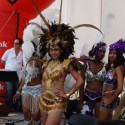Twenty years of dance and innovation
 Toronto’s Ballet Creole dances its way to a milestone
Toronto’s Ballet Creole dances its way to a milestone
BY: Stephanie Pollard
When speaking with Patrick Parson, founder and artistic director of Ballet Creole, the conversation almost instantly turns to images of dance studios, graceful bodies and the passion that his most cherished creation needs in order to keep growing. The tenacious spirit of African retention hidden in traditional dances from the Caribbean, blended with the grace of ballet, forms the cacophony of movement that inspired Parson to start his innovative dance group. Twenty years later, the colourful thread known as Ballet Creole is still sewing itself into the tapestry of dance in Canada.
When Parson came to Canada from Trinidad and Tobago to further his studies in dance, he realized that while there were black people in dance, there was no dance company that recognized African-Caribbean movement as an art. Thus, in August 1990, Ballet Creole was created. Since then, according to Parson, the dance company has taken “…our cultural dance form into a contemporary setting and put it on the main stage in Toronto as dancer’s art. It has also put us, visually, within the contemporary world of dance.”
In fact, because of Ballet Creole, the Canadian dance world has been introduced to another realm that is wonderfully different. Dance International magazine called the company “a unique amalgam of many dance languages,” and the Scarborough Arts Council dubbed it “a vision of a new artistic tradition in Canada, created through the fusion of divergent dance and music styles.”
Having started his own dance career competing in Better Village, an island-wide competition for the arts in Trinidad and Tobago, Parson says that black dance, especially, is inspired by a multitude of cultures. But, no matter where it originates, dance has one special aspect in common.
“All dance comes from tradition, even white dance,” he says. “So, my thing is that we don’t have a ‘black dance’ per se in the professional world of dance. We have blacks in dance and we draw from a lot of aesthetics depending on our cultural background.
“I am a Caribbean man. My black dance comes from the indigenous dances of the Caribbean that revolutionized and sustained the Caribbean people.”
Ballet Creole actually thrives off of diversity, with its roots grounded in the traditions Parson mentions. To chip away at the wall that prevents diversity in mainstream dance, the school has, throughout the years, played host to choreographers and dancers from an array of countries, including Jamaica, Mexico, Brazil and the United States. Parson says that his dream has always been for people to equate Ballet Creole with The National Ballet of Canada. He hopes the diverse talent featured within the company will help it achieve this status. In the meantime, Parson plans to continue to build his audience and nurture similar passions of those who come through Ballet Creole’s doors.
“The more people who come through the school and go out there, the more people are going to be doing things in the arts,” he reasons. “Some fall by the wayside and do something else. But, the ones who continue are going to be spreading that aesthetic and that type of drive so blacks in dance will become more visible. As more people see dance can be a viable profession for Caribbean and black people, then there will be support to create a high profile [black] ballet company. ”
Until then, Ballet Creole will continue to embody three things: diversity, harmony and energy.
The Evolution of Ballet Creole
1991: Ballet Creole bursts on the dance scene, performing its first piece at the World of Music, Art and Dance festival in Toronto. 1992: Ballet Creole hosts its first dance season at the Winchester Street Theatre.
1994: The Company begins what will become an annual dance presentation at Harbourfront Centre in Toronto.
2002: Soulful Messiah, a piece set to a modern rendition of Handel’s Messiah, is presented to rave reviews.
- Ballet Creole continues its reign as Canada’s premier black dance collective with Sankofa, in presentation from April 15-17 at the Fleck Dance Theatre. For more information on Ballet Creole, visit balletcreole.org or call 416-960-0350














Leave your response!